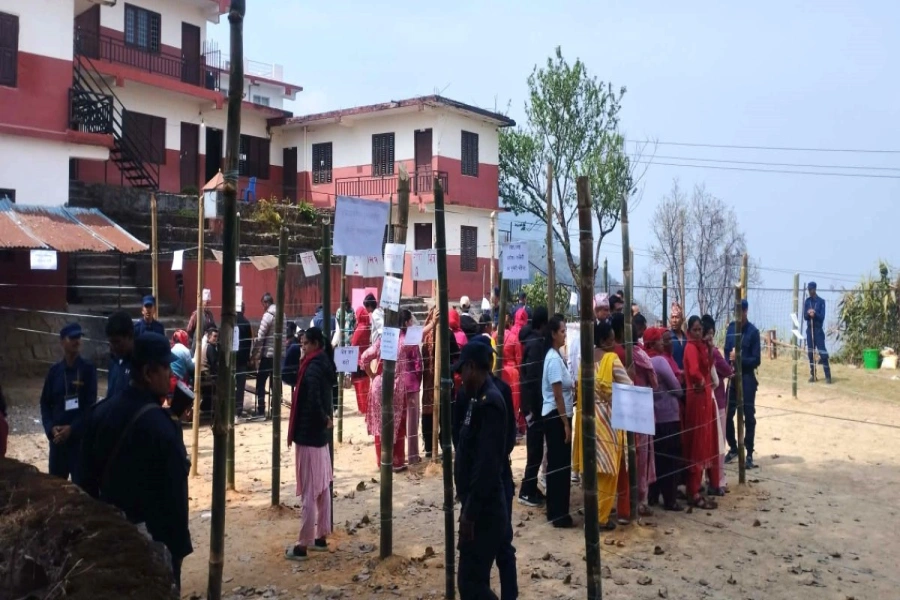The former Ecuadorian Minister of Foreign Affairs who leads the 193-member world body, pointed out that in 2105 it would have taken 30 years to close the gender gap, but now, she told the Commission on the Status of Women (CSW), if current trends continue, gender parity will not be reached for “107 years”.
She commended the under-appreciated women of past who “were made invisible, erased from history”, saying they “have been protagonists in the destinies of entire nations; of culture and political thinking; science and innovation; and the most significant social changes”.
“We don’t know anything about many of them” she continued. But for those we do, we must recognize their bravery and “the immense contribution” they made to humanity. “Today we are here for them”, she underscored.

General Assembly President María Fernanda Espinosa Garcés (left) with (from left to right): President Kersti Kaljulaid of Estonia; Prime Minister Katrín Jakobsdóttir of Iceland; and President Paula-Mae Weekes of Trinidad and Tobago, following their press briefing on the high-Level event on ‘Women in Power’. UNPhoto/Mark Garten
Espinosa praised the leap forward towards full gender parity at the UN, under Secretary-General António Guterres, saying it was a “testament to the fact that when there is political will, and leadership, it is possible to change the course of history”.
‘Push back against the push backs’
Guterres informed the high-level event that “for the first time in history, the UN Senior Management Group is comprised of more women than men”, adding “we have achieved another first – parity among the Resident Coordinators – our leading officials on the ground.”
He noted that resistance and obstacles remained to further progress at the UN, promising that: “We will push back against the pushbacks, and we will not give up until we reach parity across the board”.
UML-led protest could invite regression, PM warns

While the UN was on its way “to reaching parity at all senior levels by 2021”, Guterres lamented that it was far from the case elsewhere.
Women and girls represent half of the global population, yet, women continue to be underrepresented in leadership positions in every region of the world.
As of October, only nine per cent of Member States had a female Head of State or Government and only 24 per cent of parliamentarians were women, according to the UN.
Moreover, in 31 States, women account for less than 10 per cent of parliamentarians in single or lower houses, with four chambers lacking any women members at all. And among the 2018 “Fortune 500” rankings of leading US businesses, only 24 have women CEOs and 12 companies have no women at all on their board.
“We need parity to change power relations”, Guterres said in conclusion, thanking the gathering “for powering the change our world needs”.
“Without women in politics, sustainable development, human rights and peace, will be seriously jeopardized,” she stated. We need more women in politics”.
‘Obliged to be changemakers’
Speaking on behalf of UN Women, Executive Director Phumzile Mlambo-Ngcuka said it was “unprecedented” for women to currently hold the presidencies of the General Assembly, Economic and Social Council (ECOSOC), UN Women’s board and CSW chair, along with the Deputy Secretary-General post.
While observing that “there are changes”, she flagged some of many challenges, such as that only 10 countries have gender-equal cabinets and only five per cent of all corporate CEOs are women, adding “and these numbers are coming down”.
Because our institutions were “made for men and by men”, we need to make changes otherwise “we are slipping on the job”, Mlambo-Ngcuka said.
“We therefore, are obliged to be changemakers wherever we are and open paths for other women and lift as we climb”, the UN Women chief stated.
Many speakers highlighted how women are held to a different standard, including having to meet certain requirements when it comes to how they look in public.
Katrín Jakobsdóttir, the Prime Minister of Iceland, noted that just 10 minutes before taking the podium, she had been asked where the Prime Minister of Iceland was. For her part, Marta Lucía Ramírez, Vice-President of Colombia, said that until she introduced legislation to change it, women were prohibited from rising to the rank of General in the Armed Forces.
Only one-in-five ministers is a woman

Inter-Parliamentary Union. Women in Politics: 2019. Download a larger free copy of Women in Politics: 2019 map
Meanwhile, as the CSW meeting was underway, a new study was launched by UN Women and the Inter-Parliamentary Union, revealing that only one-in-five ministers around the world is a woman.
Calling it nonetheless “an all-time” high, the 2019 edition of Women in Politics indicates that out of 3,922 ministers, 812 are women – a 2.4 percentage points advance on 2017 figures.
According to the data presented, women’s representation in top-level leadership has decreased from 7.2 per cent of elected Heads of State to 6.6 per cent, or just 10 out of 153, and from 5.7 per cent of heads of government to 5.2 per cent, or 10 out of 193.
“More women in politics leads to more inclusive decisions and can change people’s image of what a leader looks like,” Mlambo-Ngcuka underscored, saying “we still have a steep road ahead”.
The study showed that Ethiopia, Mexico, Pakistan, Mauritania, Palau and Tonga saw the strongest gains in the number of women cabinet ministers while that number dropped in Slovenia, Japan and the Philippines. Furthermore, Azerbaijan, Belize, Brunei Darussalam, Iraq, Kiribati, Lithuania, Papua New Guinea, Saint Vincent and the Grenadines, Saudi Arabia, Thailand and Vanuatu have no women ministers.
We need “bold moves” if “we are to dramatically increase women’s representation in decision-making” concluded Mlambo-Ngcuka.





































